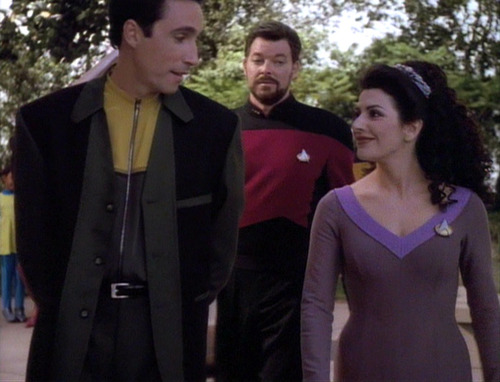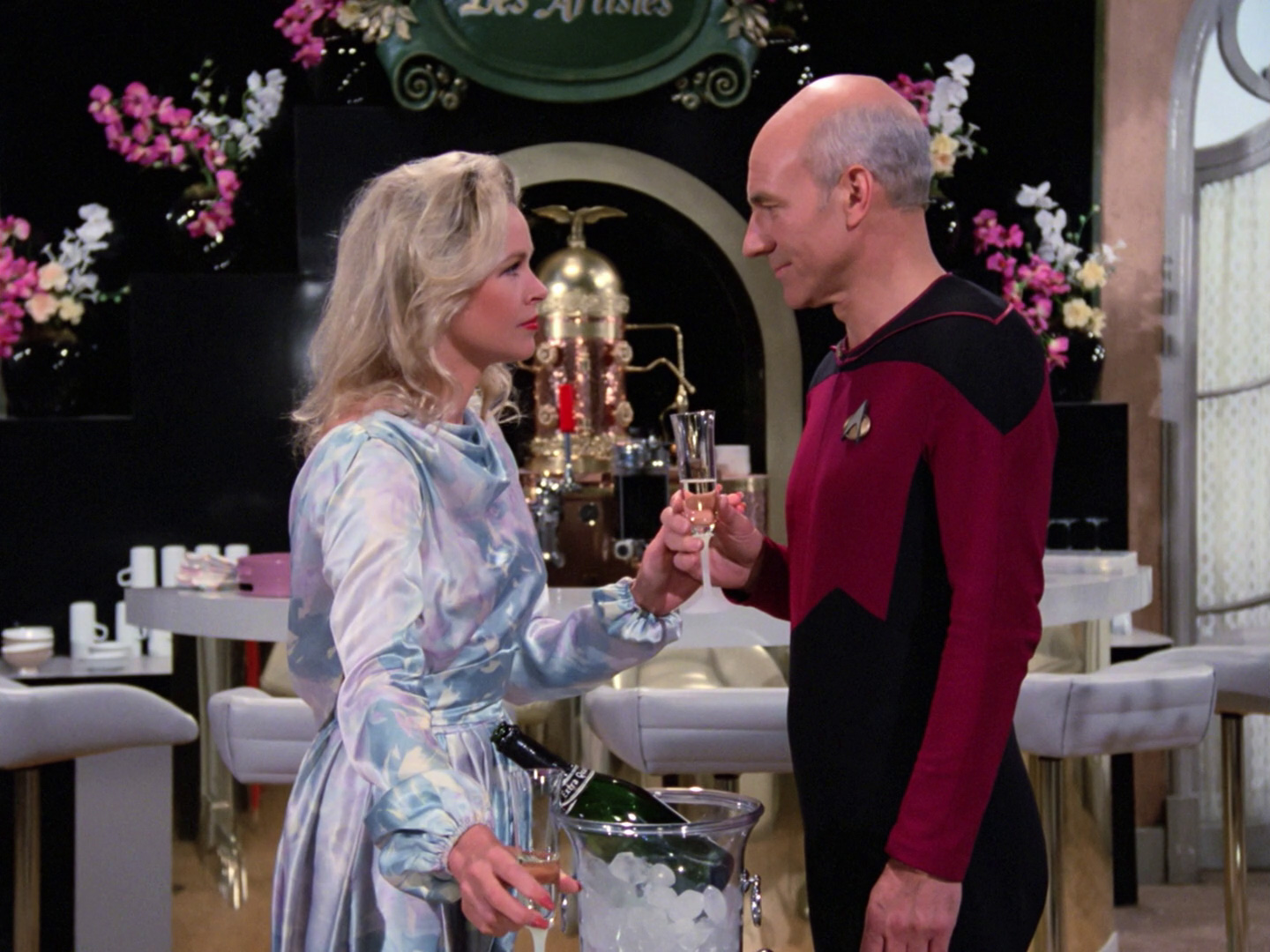“Elogium” is an episode that looks at relationships and procreation in three ways: Kes goes through puberty and considers whether she wants to become a mother, Voyager encounters a swarm of space-dwelling aliens who think the ship is a potential mate, and Janeway has to consider the ramifications of her crew hooking up and producing kids.
The latter is driven by Chakotay’s report about running into two frisky crew members making out in a turbolift, and while it’s a minor part of the overall plot it says a lot about what kind of relationships are considered “normal”.
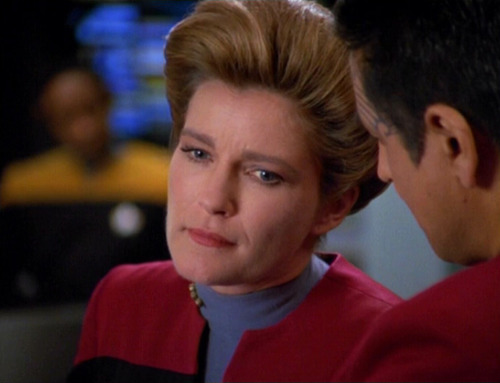
Chakotay: (lowering his voice) This morning I interrupted a couple who were kissing in the turbolift, and I’ve been wondering if we should establish a policy regarding fraternization.
Janeway: Well, the couple in question might be urged to show a bit more discretion, but Starfleet has always been reluctant to regulate peoples’ personal lives.
Chakotay: Of course. But we’re in a unique situation here. The development of intimate relationships might cause us problems that wouldn’t arise on other ships.
Janeway: I understand what you’re saying but, we’re a long way from home. Everyone is lonely, and all we have is each other. I think eventually people will begin to pair off.
The key phrase here is “pair off” and I’d argue the subtext, along with the fact we never see gay characters on Voyager, presumes that the rest of the crew will naturally settle into monogamous heterosexuality.
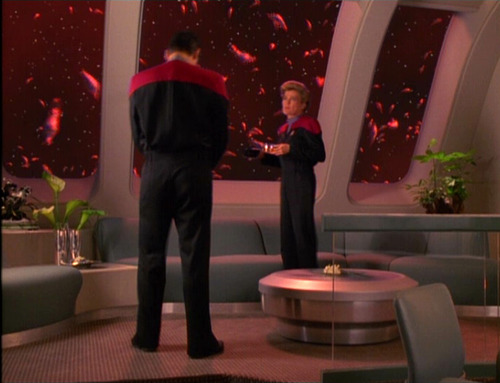
A little later Janeway and Chakotay expand their discussion on relationships to also consider what would happen the crew starts having babies.
Chakotay: I wasn’t even thinking about procreation, but I suppose it’s the inevitable outcome. We should consider the fact that it might be necessary for the crew to start having children.
Janeway: It might take us a long time to get home.
Chakotay: If it does take seventy five years, we’re going to need a replacement crew in about half that time.
The presumption of monogamous heterosexuality is strengthened by Chakotay’s observation that having babies is “the inevitable outcome” of crew members having sex.
As far as I know, birth control still exists in the 24th century so while some crew members might choose to have kids, it’s certainly not inevitable.
And the talk of a “replacement crew” is starting to get a little creepy. Luckily for now, Janeway acknowledges that in Kes’ case, whether or not to conceive is her decision.
In these conversations, we also get a look at Janeway’s feeling that her role as captain means she has to sacrifice her love (and sex) life. In the earlier scene when Chakotay asks if “pairing off” includes her, Janeway replies, “As captain, that’s a luxury I don’t have. Besides, I intend for us to be home before, before Mark gives me up for dead.”
Janeway’s romantic martyrdom is one of the best example of a gendered double-standard applied to the Trek captains. Janeway does get to have a fling here and there, once it’s clear Mark has moved on, but only rarely never without being forced to make a tough choice for the good of her ship.
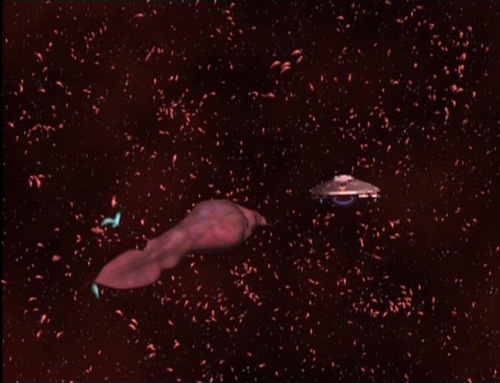
Now I want to take a quick look at the alien swarm before getting into the meat of the plot, which is Kes’ story.
One interesting thing about the swarm is that there’s a clear visual allusion to sperm. One of the first observations Janeway makes is that “they flagellate”. And the images of the cloud were CGI, but partly composited from footage of magnified sperm [x]. The reddish tone in the space around them further creates the sense that we’re looking into a womb.
The crew doesn’t realize until near the end that the smaller creatures are trying to mate with Voyager. When the larger creature shows up, Chakotay eventually recommends they behave submissively so “we’d be acknowledging that he’s dominant.”
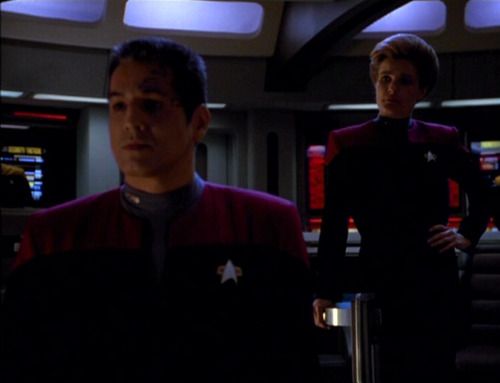
In this dialogue there’s another assumption: the larger, more aggressive and territorial creature is male. This might be lazy writing and not an intentional statement about the traits of the larger creature, but I’d hope in the future that there would be more gender-neutral language options and “he” wouldn’t still be the pronoun used predominantly to refer to anything you aren’t sure about.
Now, onto Kes and her experience with puberty, or “elogium.”
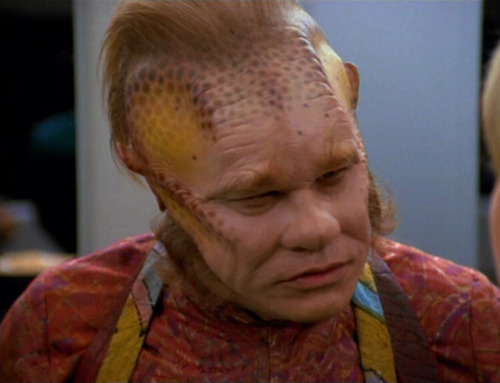
First, let’s acknowledge a couple of things:
1. The relationship between Neelix and Kes is creepy, regardless of the age difference
As I’ve mentioned in other reviews Neelix’s behaviour towards Kes tends to be condescending and territorial. We see a bit of both in “Elogium”.
On the territorial front, he’s yet again jealous of Tom Paris and this time even snaps at Kes after Tom helps her carry some lettuce up to the mess hall (see above screencap to catch the aggression in his face).
Kes: Neelix, this is getting ridiculous. You’re imagining things that aren’t there.
Neelix: You’re such an innocent! I see the way he looks at you. I used to look at women that way. I know what it means.
His words say, “I’m protecting you” but his attitude says, “You’re mine.”
The “you’re such an innocent” line also exemplifies the condescension and basically conveys a complete lack of trust and respect for her judgment and desires.
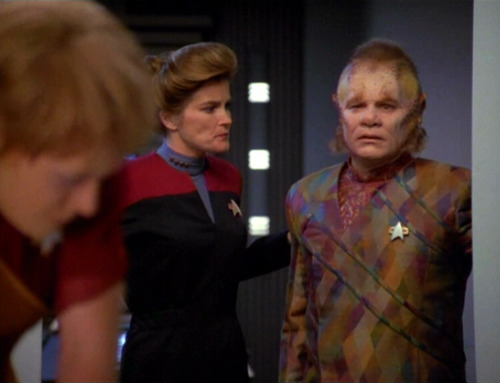
It’s telling that when Kes finally does tell someone what’s happening to her, it’s not Neelix but Janeway. This is after Neelix literally carries Kes to Sickbay in a scene that I think is supposed to be funny, but which I have a hard time laughing at given the overall creepitude. it’s also after the Doctor has thrown Neelix out for getting in the way of him figuring out what’s wrong.
When Kes does tell Neelix what’s up, he’s pretty much incapable of supporting her because he’s so stressed about what being a father would mean for him. He expresses relief that he has 50 hours to make a decision and then basically bolts.
To be fair, Kes does a great job strongly countering Neelix’s ridiculous objections, including pointing out that having a child wouldn’t mean she’d have to stop her medical studies.
When he finally does come around, he gets territorial again when Kes suggests the Doctor rub her feet as part of the fertility ritual.
And at the end of the day when she decides not to have a child, she’s the one who has to come and comfort him.
Augh, Kes, you could do so much better! (single for sure, or with literally almost anyone else on board)
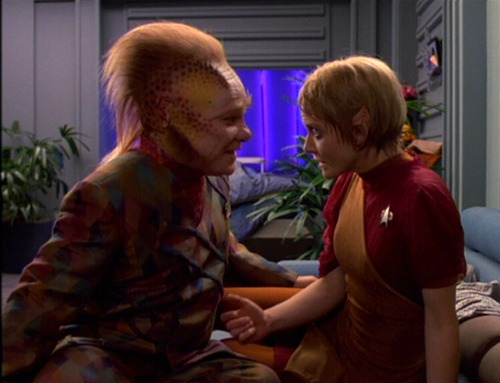
2. The age difference makes it worse
I never really thought too much about Kes and Neelix’s age difference, because I thought that Kes was meant to be seen as around age 20 (Jennifer Lien was 21 when Voyager first aired) and definitely much brighter and wiser than that. I also thought it was clear that she was brighter, wiser and overall more mature than Neelix.
Like I said, the relationship dynamics were bad enough regardless of their relative ages. But I never really thought there was a serious issue around her ability to consent.
But tartapplesauce wrote a compelling analysis of why the age difference is super skeevy. I’ll quote a little bit but I suggest reading the whole thing:
If 1 Ocampan year = 9 Human, then Kes is between the ages of 9 and 18 in Human terms. That means Neelix took up with her before she was even age of consent (in the U.S.A. this ranges between 16 – 18, as far as I can make out from a quick glance at a Wikipedia article).
Even if he only started sleeping with her once they came aboard “Voyager”, this is uncomfortable. But it gets even worse if, as is stated, the elogium is directly analogous to Human puberty. Kes is freaked out because she’s too young for this to be happening. In Humans, puberty in females happens roughly around the age of 12 (in modern times).
This means Neelix is in a romantic/sexual relationship with a girl younger than the Human equivalent of 12 years old, or 14 if you want to stretch it to give him the benefit of the doubt.
When I started looking into it, there is evidence that Kes is supposed to be the equivalent of a human teenager. Memory Alpha quotes Kenneth Biller, who co-wrote the teleplay as saying Kes’ experience in this episode was supposed to be a metaphor for teen pregnancy.
And while we don’t know how old Neelix is, I would argue we read him as approximately 40, the age Ethan Phillips was in 1995. Here in Canada, unless Kes was 16 or older (accounting for Ocampan-Human differences), if they did mate it would be considered sexual assault.
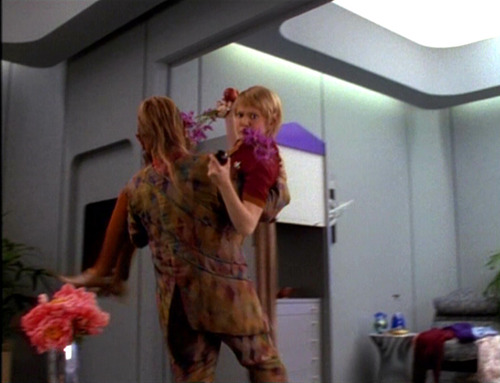
Biller clarifies that the writers wanted it to be clear Kes and Neelix had not had sex before this point, again showing they were worried about how the age difference would appear, which makes me wonder why they thought them even having a romantic, non-sexual relationship was necessary or even okay.
“I wanted them to be living together and doing it, but Jeri [Taylor] and Rick [Berman] had some concerns that she is so young. Are we sending the right message to say that they are screwing? Isn’t it more interesting if we show the time they have to first confront this issue?”
Overall in “Elogium” I think Kes comes across as smart, true to herself, and articulate in expressing her hopes and fears. But her relationship with Neelix on the whole is still seriously uncool.
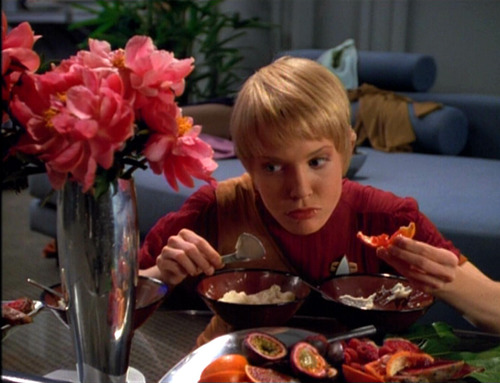
I want to note quickly the depictions of the symptoms of Kes’ puberty/fertility. On the more creative/alien side, we see yellow hands, needing to “bond” for six days, and getting ready to carry her fetus in a sac on her back. On the side that draws from pregnancy tropes we as humans are familiar with, she has wacky cravings, her body temperature rises and she becomes very emotional (though I’d argue that’s presented without any negative judgment, as justified given the circumstance).
I have to mention that in spite of all the issues I’ve raised, there are some legitimately great scenes, from a feminist perspective, in this episode.
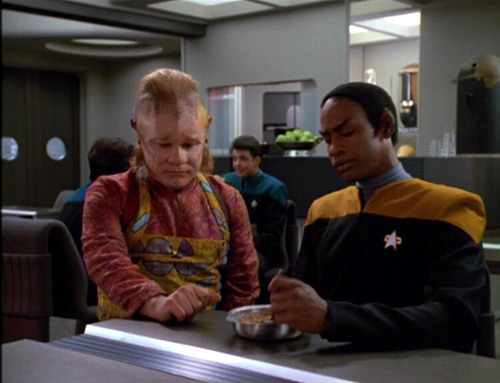
For one, I love that Tuvok, the voice of logic, is the one who calmly calls Neelix out when he starts making gendered assumptions about his future child.
Neelix: Now that I think about it, it might be fun to have a little guy around. We could do a lot together. I’ve got quite a bit I could teach a boy, you know. Survival methods, piloting skills, romantic techniques.
Tuvok: If you say so. But I must point out that there is an equal chance that you would have a daughter.
Neelix: A daughter? I don’t have anything to teach a daughter.
Tuvok: Why would it be any different from what you would teach a son?
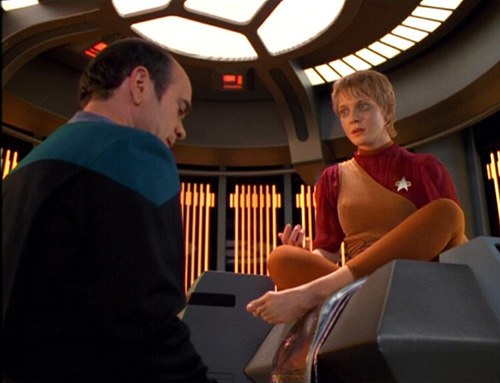
The other highlight for me is when Kes makes her final decision while talking with the Doctor. Though she’s struggling with the decision and asks him for his advice, she clearly makes her own choice.
Kes: Maybe I just felt I should have a child because I could.
Doctor: There is a powerful biological drive, at times almost impossible to resist. Species are driven by these urges in order to survive.
Kes: But isn’t that why we have minds? To look beyond biological urges, to consider their consequences? If I’m going to ask myself to look at those consequences, then I have to ask myself some questions. Am I really ready to have a child? Am I prepared to give that child the attention and devotion it deserves? Am I capable of taking on such a huge responsibility? There’s so much I haven’t done. There’s so much I want to study and learn. I’m not sure I’m finished growing. How can I help a child grow?
I love how Kes acknowledges the pressure on her that because she could bear children she felt she should. I’m sure that’s something a lot of women even today can relate to.
And so I also love that line “But isn’t that why we have minds? To look beyond biological urges, to consider their consequences?” I’m totally going to pull that one out the next time my mom suggests I’m ignoring my biological clock.
At the end of the day “Elogium” portrays mating and pregnancy as biological processes, involving tears and sweating and hormones and giant space sperm and the red warmth of a womb.
But it also says through Kes’ story that women are more than their biology, that they have the right to choose if and when to have children when it’s right for them.
Bechdel-Wallace Test: Pass. Janeway and Kes talk about the elogium, Janeway and B’Elannna talk about how to use the deflector array to repel the aliens, Wildman tells Janeway she’s pregnant.









